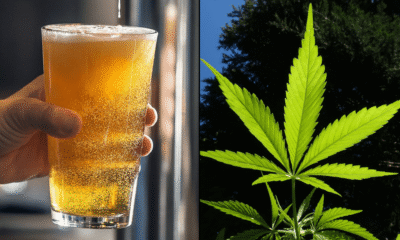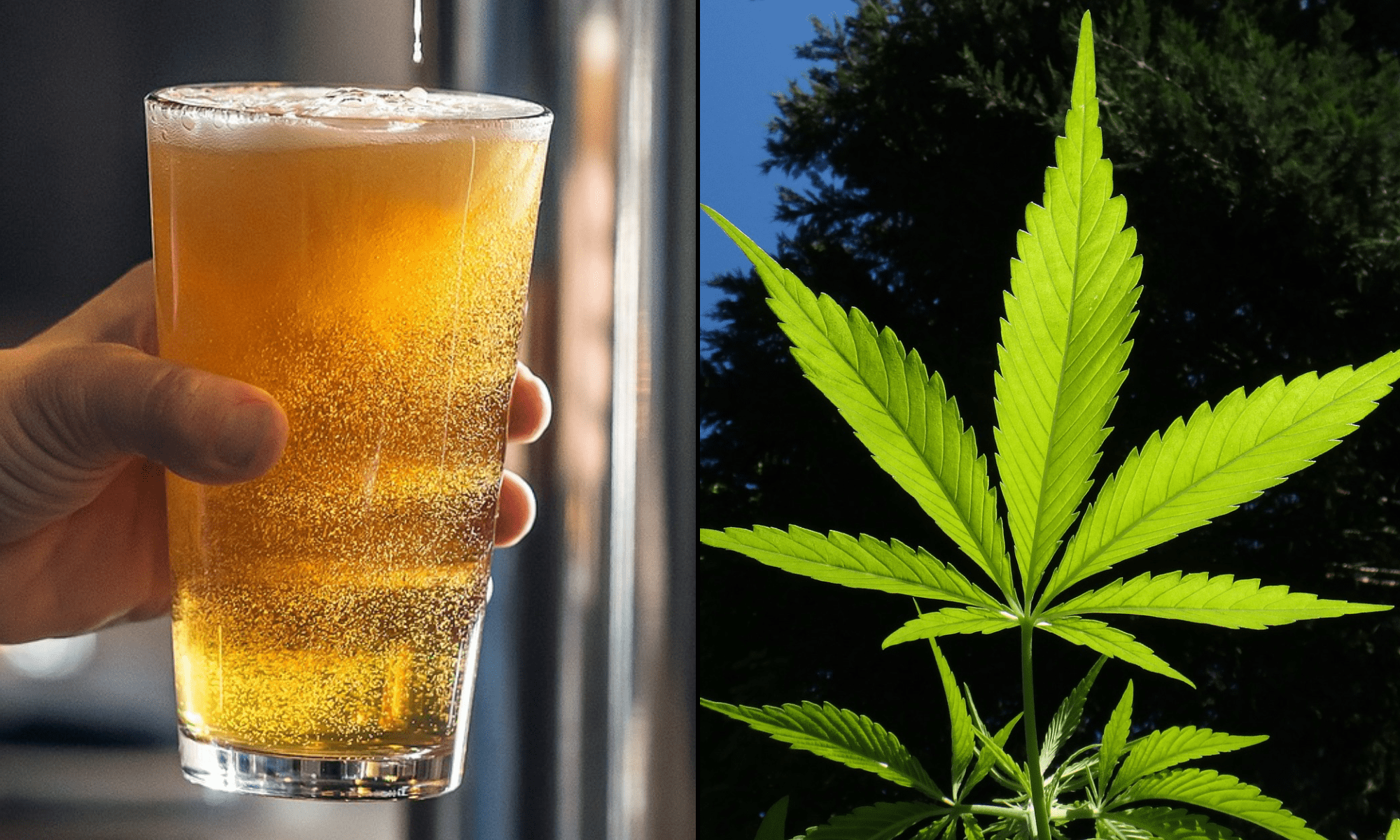featured
These Alcohol, Pharmaceutical And Food Companies Lobbied Congress On Marijuana And Psychedelics, New Records Show
Published
2 weeks agoon

While there’s been limited action in Congress on marijuana legislation so far this year, that hasn’t stopped a variety of interests—including advocacy organizations, industry stakeholders, prohibitionists, beer distributors, pharmaceutical companies and more—from putting dollars toward federal lobbying on the issue.
A look at the latest lobbying disclosures for the 2nd quarter of 2025, which covers April 1-June 30, reveals a wide range of activity around cannabis policy. Some descriptions of certain entities’ lobbying focus identify specific bills and issues, while other reports more vaguely name “cannabis” or “marijuana” as the topic of interest, without necessarily indicating a pro- or anti-reform position.
Several themes emerged in the disclosure reports, with cannabis banking reform and rescheduling being focal points in much of the marijuana-related lobbying over recent months. Many firms also described work that specifically targeted must-pass appropriations legislation, rather than standalone bills that some feel are unlikely to advance in the GOP-controlled House and Senate.
Among the notable entities reporting lobbying on cannabis are Mondelez Global, the parent company of multiple major snack brands like Oreo and Sour Patch Kids, the beer giant Anheuser-Busch Companies, PayPal and the University of Mississippi.
The last quarter also saw a handful of institutions and companies disclose lobbying on psychedelics issues—a subject of increasing bipartisan interest in Congress over recent sessions.
Here’s who disclosed lobbying on marijuana and psychedelics policy issues, with direct quotes from the latest filings on what they focused on:
Cannabis and psychedelics stakeholders and advocacy organizations
- National Cannabis Industry Association (NCIA): Discussed potential cannabis-related appropriations amendments to CJS and FSGG subcommittee bills, including the reauthorization of the “Joyce-Blumenauer Medical Amendment”, as well as the State Legal Cannabis Protections Expansion (McClintock Joyce Blumenauer Amendment) and SAFE Banking Amendment; Lobbied offices on comprehensive marijuana reform, including provisions related to criminal, restorative, and economic justice for communities most impacted by cannabis prohibition; Lobbied against S. 471 and H.R. 1447, the No Deductions for Marijuana Businesses Act; Also discussed FY26 Ag/FDA subcommittee bills, particularly portions pertaining to hemp, quantifiable amounts of THC, and report language.
- NORML: Support Evidence-Based Drug Policy Act of 2025; Support HR-966 Safe Cannabis Use for Veterans; Support HR-2934 STATES 2.0 Act; Support HR-2935 Prepare Act; Oppose HR-1447 No Deductions for Marijuana Businesses Act; Oppose HR-875 Immigrants with DUID conviction eligible for deportation.
- Drug Policy Alliance (DPA): Federal marijuana reform, primarily descheduling legislation, such as the MORE Act and CAOA, as well as narrower related legislation.
- Students for Sensible Drug Policy (SSDP): Opposition to S. 331 HALT Fentanyl Act; Support for cannabis decriminalization and retroactive justice (including H.R.6028 – States Reform Act, S.4226 – Cannabis Administration and Opportunity Act, H.R.5601 – MORE Act, H.R.2677/S.4161 – HOPE Act, H.R.10248 – Weldon Angelos Presidential Pardon Expungements Act, H.R.3082 – Evidence-Based Drug Policy Act, H.R.2772 – GRAM Act, H.R.7094/S.3671 – Marijuana in Federally Assisted Housing Parity Act, S.2650/H.R.2598 PREPARE Act, H.R.2934 – STATES 2.0 Act, H.R.966 – Veterans Cannabis Use for Safe Healing Act); S.5111 Fair Future Act; Support for psychedelic research and therapy.
- U.S. Cannabis Council (USCC): Related to cannabis industry.
- American Trade Association for Cannabis and Hemp (ATACH): Treatment of hemp-derived intoxicants as related to farm bill and appropriations packages.
- Coalition for Cannabis Policy, Education and Regulation (CPEAR): Issues pertaining to government-wide federal regulation of cannabis H.R. 2934 STATES 2.0 Act.
- Trulieve: Cannabis and cannabis related legislation, including SAFER Banking Act.
- Cresco Labs: The SAFER Banking Act, Section. 2860 – Issues related to cannabis laws and regulations.
- Curaleaf: Proposals to create protections for depository institutions that provide financial services to cannabis-related legitimate businesses and services for such businesses (SAFE Banking Act).
- U.S. Cannabis Roundtable (USCR): Secure and Fair Enforcement Banking Act – SAFE(R) – To be introduced in the 119th Congress, the bill provides protection for banks and credit unions from federal penalties when they provide services to legally operating cannabis businesses; The rescheduling of cannabis from Schedule I to Schedule III of the Controlled Substances Act. Ending needless arrests and incarceration for cannabis conduct; The farm bill and any language addressing hemp.
- Weedmaps: Issues related to healthcare and cannabis.
- Verano Holdings: Provide strategic counsel and advocate on issues related to SAFE Banking Act, other related tax issues, and cannabis rescheduling
- Good Day Farm: Legislative and regulatory issues related to medical cannabis; Farm Bill Reauthorization; FY2025 budget reconciliation process; FY2026 Agriculture Appropriations Bill.
- Curio Wellness: Educate policymakers on the need for cannabis banking reform; Monitor updates surrounding Section 280e of the Internal Revenue Code and the reintroduction of “Small Business Tax Equity Act” draft; Educate policymakers and regulators on the impact of rescheduling versus de-scheduling cannabis; Educate policymakers and regulators on synthetically derived intoxicating hemp products.
- Reason for Hope: Issues related to psychedelics research and psychedelic-assisted therapy.
- Compass Pathways: Discussions regarding legislative and regulatory issues, including appropriations, pertaining to the use and application of psychedelic medicines.
Alcohol companies and organizations
- Wine and Spirits Wholesalers of America (WSWA): Intoxicating Hemp/ cannabis Policy Issues; Prepare Act, H.R. 2935.
- Anheuser-Busch Companies: Differentiation of beer from cannabis and hemp in tax and regulation.
- National Beer Wholesalers Association: Issues related to legal banking and effective regulation for cannabis products.
- Distilled Spirits Council of the U.S.: Cannabis and regulatory issues.
Pharmaceutical companies
- Jazz Pharmaceuticals: FDA regulation of CBD Issues related to the regulation of cannabis and CBD, research and development of cannabis-derived therapies Farm, Food, and National Security Act; Issues related to the research and development of cannabis-derived therapies and FDA’s regulatory framework for CBD; Issues related to the regulation of hemp-derived cannabinoids, including H.R. 4121, FY26 Agriculture, FDA and Related Agencies Appropriations.
- Otsuka America Pharmaceutical: Psychedelics treatments for PTSD and mental health.
Prohibitionists
- Smart Approaches to Marijuana (SAM): Issues related to STATES Act to legalize marijuana; Appropriations amendments related to marijuana legalization; and criminal justice reform related to marijuana; Issues related to SAFE Banking Act regarding marijuana banking and investment; The effects of marijuana on children and the nexus between marijuana and psychosis; Safety issues surrounding marijuana. Marketing of high potency marijuana products to children; Federal role in marijuana laws; the legalization of marijuana; and criminal justice reform.
Cities and counties
- Humboldt County, California: Farm Bill Reauthorization, Cannabis Legislation.
- Medford, Oregon: Support legislation to remove banking restrictions on recreational and medical cannabis dispensaries.
Financial institutions and services
- PayPal: Issues related to cannabis banking, S. 1357, SAFE Banking Act, all provisions.
- National Association of State Treasurers (NAST): Banking issues related to marijuana policies.
- Credit Union National Association (CUNA): Issues related to marijuana banking
- National Association of Mutual Insurance Companies: Legislation affecting the regulation of insurance products and companies, including issues related… cannabis-related banking.
- Michigan Credit Union League: While MCUL takes no position on the issue of cannabis legalization, it supports the introduction and passage of legislation that would provide a safe harbor for financial institutions to serve their members needs in states where cannabis use has become legal.
- Community Bankers Association of Illinois: Federal Safe Harbor for Banking Cannabis-Related Businesses. Without taking a position on the legalization of cannabis, CBAI supports a federal safe harbor from sanctions for financial institutions that choose to serve legally compliant cannabis-related businesses (CRBs) and ancillary businesses that have commercial relationships with CBRs, in states where cannabis is legal. Allowing these businesses access to the traditional banking system and its services, versus operating exclusively in cash, is a public safety issue.
Miscellaneous
- American Civil Liberties Union (ACLU): Cannabis Administration and Opportunity Act (CAOA) and Marijuana Opportunity Reinvestment and Expungement (MORE) Act – federal drug policy reform.
- University of Mississippi: Federal regulation of cannabis research.
- Mondelez Global: Issues related to cannabis edibles.
- Johns Hopkins University: Psychedelic Research.
- New York University (NYU) Langone Medical Center: Psychedelic research related issues.
- American Academy of Addiction Psychiatry: Cannabidiol and Cannabis related issues.
- American Psychological Association: Psychedelic assisted therapy.
- National Association of Criminal Defense Lawyers (NACDL): Marijuana Opportunity Reinvestment and Expungement (MORE) Act.
- Epilepsy Foundation: Support rescheduling and safe and legal access to cannabis.
Again, not every firm detailed a specific position on the issues they lobbied on, but in general the descriptions indicate that the bulk of those working on marijuana and psychedelics policy are vying for reform. To the extent those dollars will translate into action in the 119th Congress largely remain to be seen.

Author: mscannabiz.com
MScannaBIZ for all you Mississippi Cannabis News and Information.
You may like
-


A Fresh Start: Vicksburg Nutrition brings health, flavor, and heart to the community
-


New York State Faces Lawsuit After Cannabis Regulators Admit Measuring Mistake
-


New Mississippi vape law takes effect in October, only FDA-authorized products allowed
-


More Young Adults Are Opting For Cannabis Drinks Over Alcohol At After-Work Happy Hours, Poll Shows
-


How AI Is Changing The Cannabis Industry
-


12 New York Cannabis Businesses Sue State Over School Proximity Fiasco
featured
New York State Faces Lawsuit After Cannabis Regulators Admit Measuring Mistake
Published
26 minutes agoon
August 18, 2025
A group of licensed cannabis dispensaries in New York is suing state regulators over a rule change that threatens to shutter or relocate dozens of businesses.
The lawsuit, filed Aug. 15 in State Supreme Court in Albany, argues that the state’s Office of Cannabis Management (OCM) abruptly reinterpreted a law requiring cannabis shops to be at least 500 feet from schools. Since 2022, regulators measured that distance from one entrance to another. In July 2025, officials said the law should have been measured from a school’s property line, a correction that rendered at least 152 dispensaries noncompliant according to the New York Times and the Associated Press.
Who Is Suing
The twelve petitioners include seven licensed businesses that are open or fully approved (ConBud, The Cannabis Place, Summit Canna, Hush, High Fade, Housing Works Cannabis Co., and Common Courtesy Dispensary) and five provisionally licensed applicants, Rezidue, Elise Pelka, Toastree, Monarch NYC, and Luxe Leaf Boutique. The businesses span Manhattan, Queens, and the Bronx, as reported by Cannabis Business Times.
The Lawsuit’s Arguments
The complaint states that regulators “poured their life savings into launching their businesses” after approvals from the state, only to be told their locations are now in violation. Petitioners say OCM changed its interpretation of the law without a formal rulemaking process, violating the State Administrative Procedure Act. They also argue that the change strips them of due process and equal protection.
“Relying on those approvals, petitioners poured their life savings into launching their businesses,” the complaint says. “They signed leases, completed build-outs, hired employees and opened their doors to the public under the state’s very detailed framework. But now, in a complete about-face, OCM incredulously claims it got the law wrong all along.”
Attorney Jorge Luis Vasquez Jr., who represents the plaintiffs, said the harm goes far beyond money. “This is way more than just financial harm to small businesses,” Vasquez told Gothamist. “This goes beyond money. This is time. This is resources. This is energy. This is building relationships with communities.”
The Stakes
State officials acknowledged the mistake affects 108 licensees and 44 provisional applicants. The OCM has told licensed businesses they can stay open for now, but cannot renew licenses until lawmakers act. Provisional applicants will need to relocate, with access to a $15 million fund that offers up to $250,000 each, according to Gothamist and the AP.
For many dispensary owners, that relief falls far short. The lawsuit cites buildout costs between $500,000 and $1 million per business, plus millions more in operational expenses. Several plaintiffs signed personal guarantees on leases, creating a risk of bankruptcy if they are forced to move, Cannabis Business Times reported.
Equity Concerns
Eleven of the twelve plaintiffs hold conditional adult-use retail dispensary (CAURD) licenses, reserved for justice-involved New Yorkers, and one holds a social and economic equity license. Plaintiffs argue the rule change undermines the state’s promise to prioritize those harmed by prohibition.
“OCM’s reinterpreted rule disproportionately harms these stakeholders and licensees and undermines the very purpose of this law,” the complaint states.
In a joint statement sent to High Times, the coalition Save New York Legal Cannabis for All said that licensed cannabis operators “have worked in good faith, invested their life savings, and followed the rules set forth by the State.” The group, which includes ConBud, The Cannabis Place, Rezidue, Summit Canna, Hush, High Fade, Elise Pelka, Housing Works Cannabis Co., Common Courtesy Dispensary, Toastree, and Monarch NYC, warned that OCM’s announcement threatens the small business owners and equity licensees who form “the backbone of this industry.”
“OCM was supposed to follow a multistep process laid out by law before making such an earth-shattering determination, yet it completely failed to do so,” the statement reads. “Worse, OCM’s proposed ‘solution’ to the damage caused by its carelessness will not actually help us. This so-called solution… still leaves licensees out of compliance, and when a cannabis business is out of compliance, it cannot access banking, real estate, or investment—no matter what the state says.”
The coalition said the lawsuit was filed “to ensure every licensed operator is protected and given a fair path to compliance and success,” and called on lawmakers to adopt a “functional solution that includes all operators, safeguards investments, and fulfills the promise of a truly equitable cannabis program that benefits all New Yorkers.”
State Response
OCM Acting Executive Director Felicia Reid apologized to affected businesses and said legislative intervention is needed to allow them to remain in place, according to the New York Times. Gov. Kathy Hochul called the error “a major screw-up” and promised to work with lawmakers to keep dispensaries open. A spokesperson for Hochul told Gothamist the governor “has been clear that she will work with the Legislature to ensure these hardworking businesses are able to continue to operate without interruption.”
Despite the turmoil, New York’s regulated cannabis market is expected to reach $1 billion in sales this year. But with hundreds of equity-focused businesses now facing relocation or closure, industry leaders warn that the proximity dispute could further destabilize an already rocky rollout.
Photo by Luca Bravo on Unsplash

Author: mscannabiz.com
MScannaBIZ for all you Mississippi Cannabis News and Information.
featured
More Young Adults Are Opting For Cannabis Drinks Over Alcohol At After-Work Happy Hours, Poll Shows
Published
2 hours agoon
August 18, 2025
Younger Americans are increasingly using cannabis-infused beverages as a substitute for alcohol—with one in three millennials and Gen Z workers choosing THC drinks over booze for after-work activities like happy hours, according to a new poll.
The survey from Drug Rehab USA assessed the recreational preferences of 1,000 employed adults, finding more evidence that as the marijuana legalization movement achieves greater success and as awareness of alcohol-related harms has spread, a significant portion of those generations are opting for cannabis over booze.
All told, 66 percent of American adults say they’ve tried alcohol alternatives over the past six months. And 24 percent of respondents said they’ve “at least partially” replaced alcohol with non-alcohol or cannabis-based drinks.
That trend is being led by millennials and Gen Z, one of three of whom said they used THC beverages instead of alcohol drinks.
“To unwind after work, 45 percent drink alcohol, while 24 percent use nicotine, 20 percent turn to cannabis, and 16 percent choose alcohol alternatives like mocktails, non-alcoholic beer, or CBD,” the survey found.
“When it comes to winding down after a long day, Americans are reaching for a mix of familiar comforts and emerging alternatives,” Drug Rehab USA said. “While alcohol still dominates, the competition between nicotine and cannabis shows how habits are evolving across generations.”
“After-work rituals are no longer limited to a nightly drink—or even to alcohol at all. From THC-infused beverages to nicotine pouches and non-alcoholic alternatives, today’s habits reflect a broader redefinition of what it means to unwind. While motivations vary—stress, routine, social connection—the through-line is clear: Americans are turning to consumable rituals to draw a line between work and rest. For many, those rituals begin within the hour and recur multiple times a week.”
The survey findings largely track with other research assessing emerging trends in cannabis and alcohol use.
For example, a recent rodent study determined that the cannabinoid CBD reduces rates of binge drinking and alcohol blood concentrations.
Results of a separate study published in the journal Molecular Psychiatry also indicated that a single, 800-milligram dose of CBD can help manage certain alcohol cravings among people with alcohol use disorder (AUD), supporting the use of the marijuana component as a potential treatment option for problem drinkers.
Federally funded research into the effects of cannabis on alcohol use that was published in May also found that people who used marijuana immediately before drinking subsequently consumed fewer alcoholic beverages and reported lower cravings for alcohol.
The study follows a separate survey analysis published in March that found that three in four young adults reported substituting cannabis for alcohol at least once per week—a “fast-emerging” trend that reflects the “rapid expansion” of the hemp product marketplace.
The report from Bloomberg Intelligence (BI) found that, across various demographics, cannabis is increasingly being used as an alternative to alcohol and even non-alcoholic beverages as more companies—including major multi-state marijuana operators (MSOs)—expand their offerings.
The findings were largely consist with a growing body of studies indicating that cannabis—whether federally legal hemp or still-prohibited marijuana—is being utilized as a substitute for many Americans amid the reform movement.
An earlier survey from YouGov, for example, found that a majority of Americans believe regular alcohol consumption is more harmful than regular marijuana use. Even so, more adults said they personally prefer drinking alcohol to consuming cannabis despite the health risks.
A separate poll released in January determined that more than half of marijuana consumers say they drink less alcohol, or none at all, after using cannabis.
Yet another survey—which was supported by the National Institute on Drug Abuse (NIDA) and released in December—found that young adults are nearly three times more likely to use marijuana than alcohol on a daily or near-daily basis.
That poll provided more granular, age-specific findings than a similar report published last year, finding that more Americans overall smoke marijuana on a daily basis than drink alcohol every day—and that alcohol drinkers are more likely to say they would benefit from limiting their use than cannabis consumers are.
A separate study published in the journal Addiction last year similarly found that there are more U.S. adults who use marijuana daily than who drink alcohol every day.
In December, BI also published the results of a survey indicating that substitution of cannabis for alcohol is “soaring” as the state-level legalization movement expands and relative perceptions of harm shift. A significant portion of Americans also said in that poll that they substitute marijuana for cigarettes and painkillers.
Another BI analysis from last September projected that the expansion of the marijuana legalization movement will continue to post a “significant threat” to the alcohol industry, citing survey data that suggests more people are using cannabis as a substitute for alcoholic beverages such a beer and wine.
Yet another study on the impact of marijuana consumption on people’s use of other drugs that was released in December suggested that, for many, cannabis may act as a less-dangerous substitute, allowing people to reduce their intake of substances such as alcohol, methamphetamine and opioids like morphine.
A study out of Canada, where marijuana is federally legal, found that legalization was “associated with a decline in beer sales,” suggesting a substitution effect.
The analyses comport with other recent survey data that more broadly looked at American views on marijuana versus alcohol. For example, a Gallup survey found that respondents view cannabis as less harmful than alcohol, tobacco and nicotine vapes—and more adults now smoke cannabis than smoke cigarettes.
A separate survey released by the American Psychiatric Association (APA) and Morning Consult last June also found that Americans consider marijuana to be significantly less dangerous than cigarettes, alcohol and opioids—and they say cannabis is less addictive than each of those substances, as well as technology.
Meanwhile, a leading alcohol industry association is calling on Congress to dial back language in a House committee-approved spending bill that would ban most consumable hemp products, instead proposing to maintain the legalization of naturally derived cannabinoids from the crop and only prohibit synthetic items.

Author: mscannabiz.com
MScannaBIZ for all you Mississippi Cannabis News and Information.

AI is bringing changes and advancements to most industries – including cannabis
Whether you are a doctor in Nebraska, a restauranteur in Baltimore or senior engineer in Bellevue, Washington, it is upending how you do your job – both good and bad. Most areas of life are being touched and here is how AI is changing the cannabis industry. Artificial Intelligence (AI) is quietly reshaping nearly every corner of modern life, and the cannabis industry is no exception. From cultivation and retail to consumer transparency, AI is bringing new efficiency, accuracy, and trust to a market long been clouded by misinformation and stigma.
RELATED: Marijuana Might Be A Better Hurricane Party Guest
One of the most visible changes is how AI helps consumers track cannabis products. In an industry where strain names and effects can vary widely, AI-driven platforms are stepping in to provide clarity. Apps now use AI to analyze lab results, customer reviews, and even chemical profiles to match consumers with products best suited to their needs—whether it is better sleep, anxiety relief, or a more social buzz. Instead of relying on word-of-mouth or vague descriptions, consumers can access personalized recommendations grounded in hard data.

AI is also helping consumers find accurate, verifiable information in a marketplace which has sometimes struggled with exaggerated claims. Machine learning models can scan thousands of lab tests, regulatory filings, and scientific studies to identify trustworthy patterns. This gives guidance so customers are less likely to fall for marketing hype and more likely to discover which products are safe, effective, and compliant with state rules. For a generation used to researching everything from skincare ingredients to fitness supplements online, AI-driven cannabis insights are a welcome tool.
On the cultivation side, AI is revolutionizing how cannabis is grown. Smart sensors, combined with predictive algorithms, can monitor temperature, humidity, and light in real time. Farmers use these insights to maximize yield while minimizing water and energy use—an especially important consideration in an era of climate concerns and sustainability demands. By predicting plant health before problems arise, AI also reduces the need for pesticides and allows for more consistent harvests.
Retailers are benefiting as well. AI-powered inventory systems can predict which products will sell fastest, helping dispensaries avoid shortages or waste. Chatbots and virtual budtenders are guiding customers through product choices, mimicking the experience of a knowledgeable staff member but available 24/7 online. These digital assistants are especially appealing to Millennial and Gen Z consumers who prefer research-based shopping and minimal in-store pressure.
RELATED: Science Says Medical Marijuana Improves Quality Of Life
Looking ahead, AI could play a role in shaping cannabis policy and public health, too. By analyzing patterns in consumption data, researchers and regulators can better understand how cannabis affects communities, potentially leading to smarter regulations and safer use guidelines. In medical marijuana research, AI is proving especially powerful. Machine learning tools can process vast sets of patient data, clinical trial results, and genetic information to identify which cannabinoids or terpenes may be most effective for specific conditions such as chronic pain, epilepsy, or anxiety. This not only speeds up research but also helps doctors personalize treatment options for patients in ways not possible even a decade ago.
AI is doing more than making cannabis more high-tech—it’s making it more transparent, sustainable, and consumer-friendly. For an industry still overcoming decades of misinformation, which is a game-changing development.

Author: mscannabiz.com
MScannaBIZ for all you Mississippi Cannabis News and Information.

A Fresh Start: Vicksburg Nutrition brings health, flavor, and heart to the community

New York State Faces Lawsuit After Cannabis Regulators Admit Measuring Mistake

New Mississippi vape law takes effect in October, only FDA-authorized products allowed

More Young Adults Are Opting For Cannabis Drinks Over Alcohol At After-Work Happy Hours, Poll Shows

How AI Is Changing The Cannabis Industry

12 New York Cannabis Businesses Sue State Over School Proximity Fiasco

Massachusetts Auditor Notes ‘Violations’ and ‘Mismanagement’ At Cannabis Control Commission

Supreme Court Gives Marijuana Companies More Time To File Petition In Case Challenging Federal Prohibition

Canopy USA Appoints New Executive Team to Accelerate Growth

Washington Adult-Use Cannabis Sales Decline for Fifth Straight Year

Delaware Governor Seeks Marijuana Regulation Advice From Colorado Counterpart As State’s Legal Market Launches

Major trucking group’s cannabis rescheduling concerns (Newsletter: August 18, 2025)

From The Vault: The HIGH TIMES interview Allen Ginsberg (1992)

Court throws out part of New York’s marijuana licensing rules

Watch Immigration Enforcement Rattles the Cannabis Industry | SoCal Matters Season 2025

Two arrested as police close four unlicensed cannabis shops in Seneca Falls

High-potency cannabis use linked to psychosis | Watch News Videos Online

High Times Strains Of The Month: August 2025

Texas Crime Labs Say They Don’t Have Enough Resources To Test Hemp Products For THC As Lawmakers Consider Ban

Trump on changes to marijuana policy: 'We're looking at it'

Realtors’ Stolen Credit Cards Are Used to Build an Illegal Marijuana Farm

Grady County Sheriff's Office makes arrests in illegal marijuana bust

High Times Was The Most Influential Publication Of My Life

Revelry NYC 2025: Inside New York’s Cannabis Culture & Industry Festival

Alert: Department of Cannabis Control updates data dashboards with full data for 2023

Connecticut Appoints The US’s First Cannabis Ombudsperson – Yes there is a pun in there and I’m Sure Erin Kirk Is Going To Hear It More Than Once!

5 best CBD creams of 2024 by Leafly

EU initiative begins bid to open access to psychedelic therapies
New Study Analyzes the Effects of THCV, CBD on Weight Loss

Free delta-9 gummies from Bay Smokes

5 best autoflower seed banks of 2024 by Leafly

Discover New York’s dankest cannabis brands [September 2024]

Curaleaf Start Process Of Getting Their Claws Into The UK’s National Health System – With Former MP (Resigned Today 30/5/24) As The Front Man

May 2024 Leafly HighLight: Pink Runtz strain

Mississippi city official pleads guilty to selling fake CBD products

Press Release: CANNRA Calls for Farm Bill to Clarify Existing State Authority to Regulate Hemp Products

Local medical cannabis dispensary reacts to MSDH pulling Rapid Analytics License – WLBT

Horn Lake denies cannabis dispensary request to allow sale of drug paraphernalia and Sunday sales | News

5 best THC drinks of 2024 by Leafly

6 best CBD gummies of 2024 by Leafly

Nevada CCB to Accept Applications for Cannabis Establishments in White Pine County – “Only one cultivation and one production license will be awarded in White Pine County”

The Daily Hit: October 2, 2024

5 best delta-9 THC gummies of 2024 by Leafly

Weekly Update: Monday, May 13, 2024 including, New Guide for Renewals & May Board meeting application deadline

PRESS RELEASE : Justice Department Submits Proposed Regulation to Reschedule Marijuana

People In This State Googled ‘Medical Marijuana’ The Most, Study Shows

Thailand: Pro-cannabis advocates rally ahead of the government’s plan to recriminalize the plant

5 best THCA flower of 2024 by Leafly
Trending
-

 California Cannabis Updates1 year ago
California Cannabis Updates1 year agoAlert: Department of Cannabis Control updates data dashboards with full data for 2023
-

 Breaking News1 year ago
Breaking News1 year agoConnecticut Appoints The US’s First Cannabis Ombudsperson – Yes there is a pun in there and I’m Sure Erin Kirk Is Going To Hear It More Than Once!
-

 best list1 year ago
best list1 year ago5 best CBD creams of 2024 by Leafly
-

 Business11 months ago
Business11 months agoEU initiative begins bid to open access to psychedelic therapies
-

 cbd1 year ago
cbd1 year agoNew Study Analyzes the Effects of THCV, CBD on Weight Loss
-

 Bay Smokes1 year ago
Bay Smokes1 year agoFree delta-9 gummies from Bay Smokes
-

 autoflower seeds11 months ago
autoflower seeds11 months ago5 best autoflower seed banks of 2024 by Leafly
-

 cannabis brands11 months ago
cannabis brands11 months agoDiscover New York’s dankest cannabis brands [September 2024]

